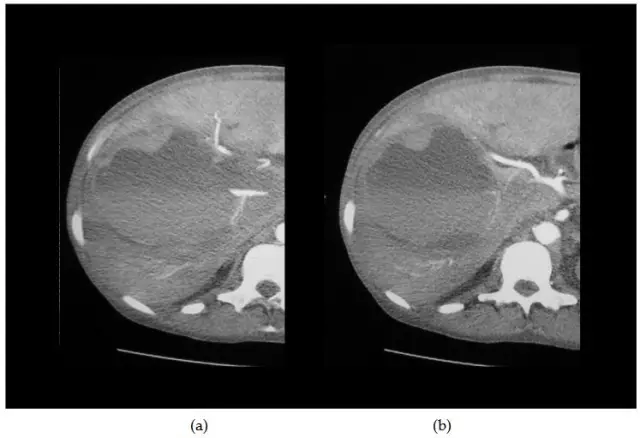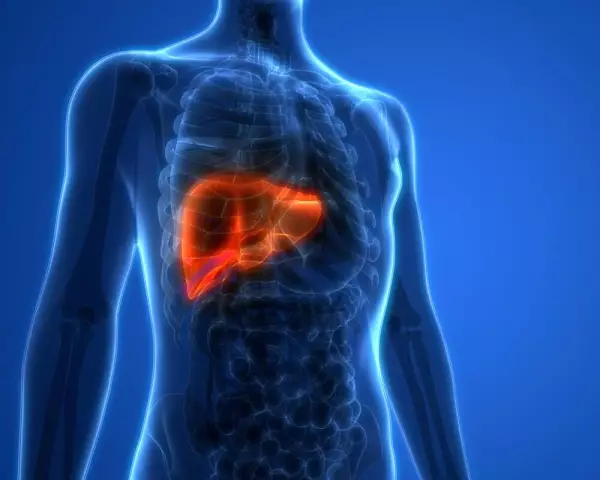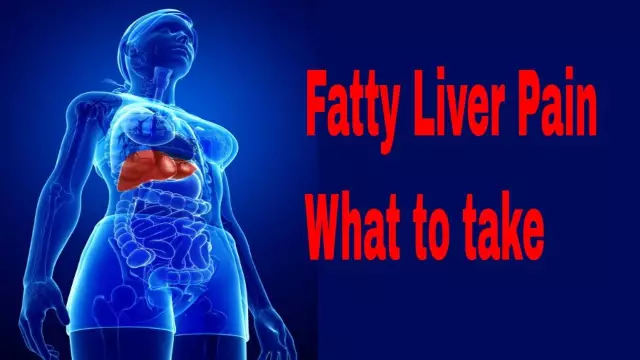- Author Rachel Wainwright wainwright@abchealthonline.com.
- Public 2023-12-15 07:39.
- Last modified 2025-11-02 20:14.
Nutritional therapy for liver diseases

Since the liver is a vital organ that performs many physiological functions, taking care of normal functioning, including proper nutrition for liver disease, is very important.
The liver is the laboratory of the body, in which the synthesis of bile acids and blood proteins, the accumulation and breakdown of glucose, and the filtration of substances coming from the intestine are carried out. Up to 20 million chemical reactions take place in liver cells every minute. The main task of the liver is to separate the substances entering it, while it sends useful substances into the body (for its normal functioning), and neutralizes and removes harmful ones. In case of violations of the liver, intoxication of the body occurs with harmful substances penetrating into the blood.
The most common causes of liver damage: infectious diseases (hepatitis viruses), fat metabolism disorders, diabetes mellitus, alcohol abuse, prolonged unhealthy diet. With any other diseases, the load on the liver also increases; to compensate for it, you need to eat right.
Therapeutic nutrition for liver diseases is based on the basic principles:
- Eating a sufficient amount of complete, easily digestible proteins;
- Fat intake is limited. The amount and quality of fat required is determined according to the patient's condition
- The consumption of carbohydrates is within the physiological norm, and for overweight patients is reduced;
- Thorough culinary processing of consumed products - long-term boiling, chopping, wiping food;
- Frequent small meals;
- Mandatory presence in the diet of fiber-rich foods.
The following should be excluded from the diet of therapeutic food for liver diseases during treatment:
- Fatty pork, lamb, goose and duck dishes;
- Any fried foods;
- Refractory fats with a melting point above 37 °, such as mutton and beef fat, lard;
- Strong rich broths, jellies;
- Smoked products;
- Canned food;
- Chocolate, cocoa;
- Spinach, sorrel, mushrooms;
- Any drinks containing alcohol;
- Cold drinks;
- Ice cream.
Nutrition for liver diseases
Nutrition for liver diseases consists in adherence to a diet (a specially designed nutrition system), as one of the main components of the treatment complex.
Medical nutrition is not only the selection of products, but also the method of cooking, its temperature when taken, the time and number of meals during the day. The first to pay attention to this, the Soviet therapist Mikhail Pevzner began to study and develop special nutrition for various types of diseases. In 1920, he published fifteen therapeutic diets for various types of diseases. Until now, for almost a hundred years, these diets have been prescribed and give excellent results when strictly followed.
For medical nutrition for liver diseases, diet (or table) No. 5 is recommended. The daily ration of diet No. 5 by chemical composition:
- Proteins - 100-120 g, at least half of them must be of animal origin;
- Fats - 80-90%, up to 40% of which are vegetable, refractory fats are excluded;
- Carbohydrates up to 450 g, including sugar not more than 70 g;
- Salt - 10 g, in case of edema it decreases to 4-5 g or is completely excluded.
The daily rate of fluid intake is 1.5-2 liters, the temperature of the food taken is normal, the dishes are steamed, baked or boiled. Eating at least four times a day, but preferably five to six times.
The daily amount of calories is 3200-3500 kcal.
Observe

diet №5 to produce stable results should be better health for a long time, at least 1.5-2 years. You should switch to a normal diet only on the recommendation and under the supervision of your doctor.
In case of exacerbations of chronic liver diseases, it is recommended to switch to a more gentle diet No. 5a. The protein content is reduced to 100 g, fat to 50-70 g, salt to 6 g. All dishes are prepared only in pureed form, extractives, essential oils, cholesterol-rich foods, and those containing coarse fiber are excluded.
Medical nutrition for liver diseases should consist of the following foods and dishes:
- Bakery products - dried or yesterday's baked wheat bread, rye bread made from wallpaper, biscuits and buns made from non-tasty dough;
- Soups - from cereals, pasta, vegetables on vegetable broth or dairy, borscht, beetroot soup, cabbage soup only (do not saute vegetables and flour), fruit soups;
- Meat and poultry - from lean varieties of poultry and meat (chicken, veal, beef, rabbit). It should be cooked in a piece, from cutlet mass or minced meat;
- Fish - low-fat varieties of sea or river fish, boiled or baked after boiling;
- Fats - butter no more than 25-30 g per day and vegetable oils no more than 30-50 g per day. Sunflower, corn, olive and other vegetable oils are added to ready-made meals without cooking in their natural form;
- Vegetable dishes and side dishes - from baked and boiled vegetables (fresh and non-acidic sauerkraut, potatoes, carrots, pumpkin, zucchini, green peas, young beans). Only boiled onions. The use of raw vegetables and vegetable juices is recommended;
- Side dishes and dishes from pasta and cereals - crumbly and semi-viscous cereals (especially oatmeal, buckwheat porridge). Various casseroles, puddings;
- Eggs and dishes from them - no more than one egg or two proteins per day;
- Fruits and berries (except for sour varieties) - raw, as well as in the form of compotes, jelly, mashed potatoes, preserves;
- Milk - whole natural, condensed, dry;
- Dairy products - sour cream, fresh cottage cheese, cheese, yogurt, kefir, acidophilic milk;
- Sauces - dairy, sour cream, with vegetable broths, fruit and berry gravies (spices are excluded, flour and butter are not sauteed);
- Snacks - vegetable salads, vinaigrettes, soaked herring, gelatinous aspic from river fish, boiled tongue, curd spreads;
- Drinks - sweet fruit and berry juices, tomato juice, tea, weak natural coffee with milk, rosehip broth;
- Honey.
These are general guidelines. The choice of specific foods for nutritional management for liver disease depends on how well it functions. It is recommended to formulate the diet under the supervision of the attending physician, since only with his help can all unfavorable factors be taken into account and serious problems due to an unbalanced diet can be avoided.
Found a mistake in the text? Select it and press Ctrl + Enter.






